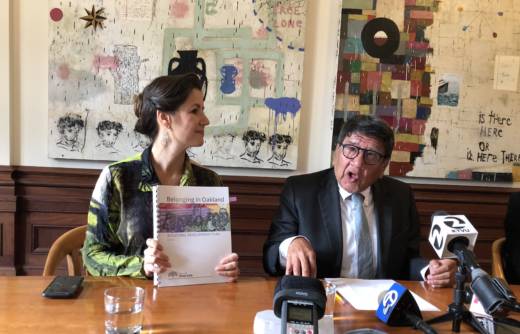Oakland officials introduced a restructured and expanded art grants program at a press conference Monday, delivering on changes envisioned in the city’s new Cultural Plan. The announcement came as city council prepares to approve 80 projects selected for the first round of 2018 funding, totaling $1,136,253.
Initiatives in the expanded program include a residency program for artists to embed as creative problem-solvers within city agencies such as transportation or planning, as well as funds for nonprofits to partner with local cultural organizations on projects fostering neighborhood identity. The former will support 3-5 artists, with the duration and award figure to be determined.
The categories reflect proposals in the city’s Cultural Plan, “Belonging in Oakland,” a roadmap for the Cultural Funding Program under the leadership of poet and longtime arts administrator Roberto Bedoya, who started as the Oakland’s first-ever cultural affairs manager in September of 2016.
The plan, Oakland’s first since 1988, describes focusing Bedoya’s agency on the roots, and not merely the symptoms, of cultural erasure at a time of widespread displacement. “What’s paramount to this process and putting the plan together is to have a vision of cultural equity at the heart of what we do,” Bedoya said at the press conference.
The budget and infrastructure of the Cultural Affairs Unit, which funds projects by organizations as well as individual artists, dramatically downsized during the Great Recession. Oakland Mayor Libby Schaaf described today’s news as part of an agency rebound.


